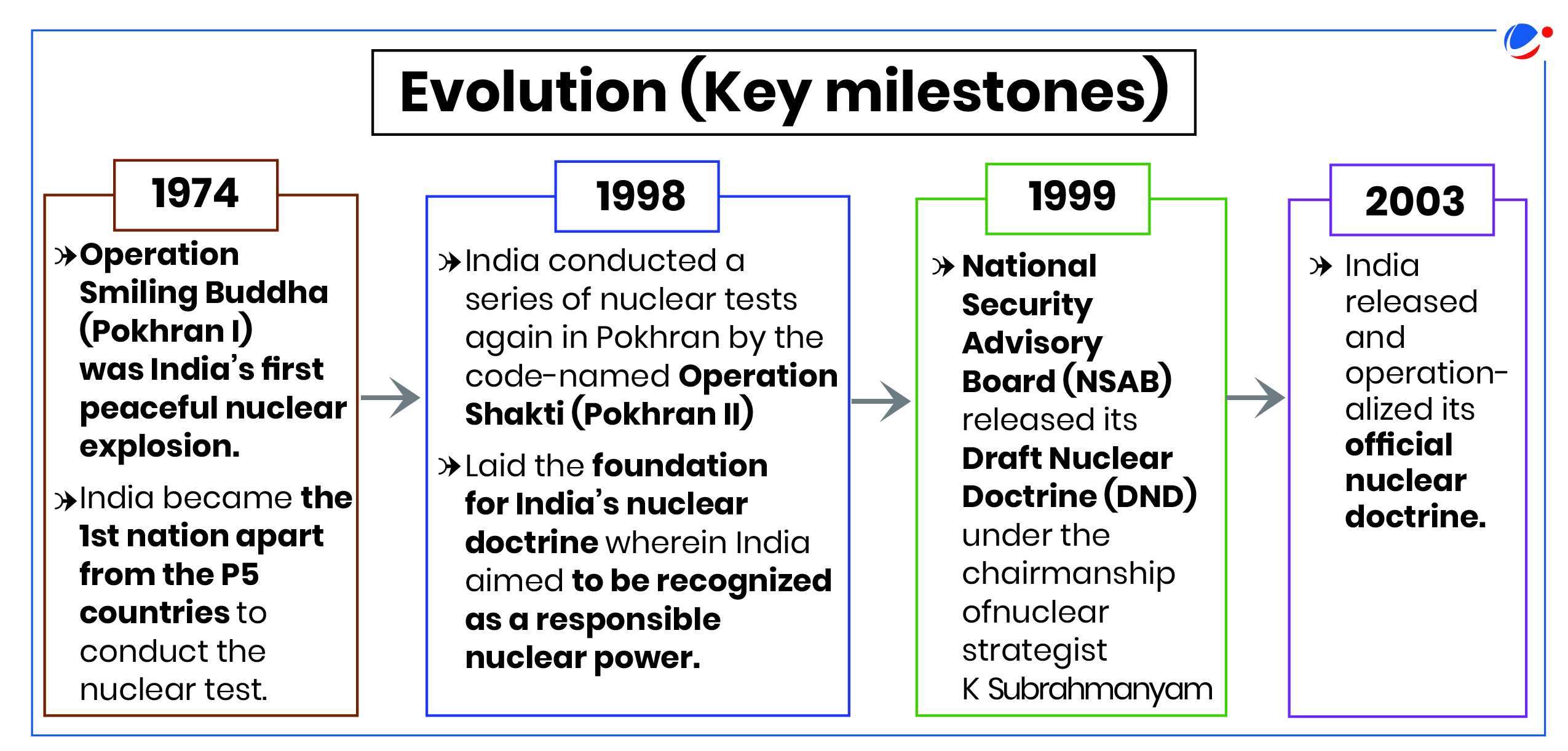Why in the news?
India is celebrating 25 years of its nuclear doctrine launch.

About India's Nuclear doctrine
Nuclear Doctrine encompasses the goals and missions that guide the deployment and use of nuclear weapons.
Key features of India's nuclear doctrine
- Building and maintaining a credible minimum deterrent: Nuclear arsenals will be minimal enough to provide credible deterrence against adversaries.
- A posture of "No First Use" (NFU): Nuclear weapons will only be used in retaliation against a nuclear attack on Indian territory or Indian forces anywhere.
- Mutually Assured Destruction (MAD) on both sides: Nuclear retaliation to a first strike will be massive and designed to inflict unacceptable damage.
- Non-use of nuclear weapons against non-nuclear weapon states (NNWS).
- Commitment to the goal of a nuclear weapon-free world. Through global, verifiable and non-discriminatory nuclear disarmament.
- Governance: Nuclear Command Authority (NCA) comprises a Political Council and an Executive Council.
- Political Council: chaired by Prime Minister, is the sole body (civilian political leadership) which can authorize the use of nuclear weapons for retaliatory attacks.
- Executive Council: chaired by National Security Advisor, provides inputs for decision making by NCA and executes the directives given to it by the Political Council.
- Other aspects of the doctrine
- Option of retaliation with nuclear weapons in the event of a major chemical or a biological weapons (CBW) strike against India.
- Continuance of strict controls on export of nuclear and missile related materials and technologies and participation in the Fissile Material Cutoff Treaty (FMCT) negotiations.
- Moratorium on nuclear tests.

India's present nuclear standing vis-a-vis the global nuclear discourse:
|
Factors underscoring need for India's nuclear doctrine
Efficacy of No First Use: It remains the most debated element of India's nuclear doctrine.
Aspect | Against NFU | In Favour of NFU |
Risk of Initial Casualties | Could lead to unacceptably high initial casualties and damage to Indian population, cities, and infrastructure. | Contributes to India's strategic restraint posture and enables civil nuclear cooperation agreements and accommodation in multilateral nuclear export control regimes. |
Ballistic Missile Defence (BMD) | An elaborate and costly BMD system required to defend against a first strike. | NFU helps India maintain a defensive and non-escalatory stance. |
Effectiveness Against Nuclear neighbours | Ineffective against Pakistan, which is lowering its threshold with Tactical Nuclear Weapons (low-yield weapons to be used in their own territory against Indian forces). | A prudent and non-escalatory approach to managing tensions with China and contributes to regional stability. |
How can the present nuclear doctrine be strengthened?
- Dedicated defence technology programs on the lines of Integrated Missile Development Programmes can be started to ensure capacity building alongside technological developments.
- Increasing flexibility on 'massive retaliation' commitment: It can lead to political actors to escalate the nuclear war, thus limiting the retaliatory options.
- To overcome this, some ambiguities could be introduced in the doctrine which enables the country to respond to threats like TNWs without it escalating to a full-fledged war.
- Synchronizing with evolving Foreign Policy in light of geopolitical changes.
- Periodic review in a constantly evolving geo-strategic world order. For instance, American and Russian governments review their nuclear policy periodically.
- The intensification of China-Pakistan relations and their growing nexus with Russia, along with geopolitical instability across the globe demands calibrated review of India's doctrine.
- Building upon its status of a responsible nuclear power to emerge as a potential leader for promoting global nuclear non-proliferation and disarmament. Following efforts can be made by India in this regard:
- Engaging in multilateral discussions at the UN and other platforms such as Conference on Disarmament to voice the security and non-proliferation issues concerning states like itself.
- Conducting open and transparent dialogues on nuclear related issues with neighbouring countries as confidence building measures and convince more countries to adopt NFU.
- Presently, China is the only other nuclear nation in addition to India that professes to follow the doctrine of NFU.




